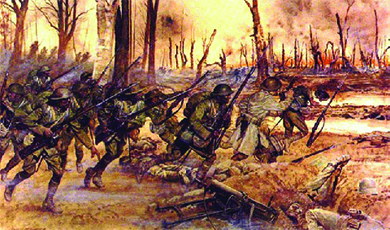| << Chapter < Page | Chapter >> Page > |
African Americans also found that the war brought upheaval and opportunity. Blacks composed 13 percent of the enlisted military, with 350,000 men serving. Colonel Charles Young of the Tenth Cavalry division served as the highest-ranking African American officer. Blacks served in segregated units and suffered from widespread racism in the military hierarchy, often serving in menial or support roles. Some troops saw combat, however, and were commended for serving with valor. The 369th Infantry, for example, known as the Harlem Hellfighters , served on the frontline of France for six months, longer than any other American unit. One hundred seventy-one men from that regiment received the Legion of Merit for meritorious service in combat. The regiment marched in a homecoming parade in New York City, was remembered in paintings ( [link] ), and was celebrated for bravery and leadership. The accolades given to them, however, in no way extended to the bulk of African Americans fighting in the war.

On the home front, African Americans, like American women, saw economic opportunities increase during the war. During the so-called Great Migration (discussed in a previous chapter), nearly 350,000 African Americans had fled the post-Civil War South for opportunities in northern urban areas. From 1910–1920, they moved north and found work in the steel, mining, shipbuilding, and automotive industries, among others. African American women also sought better employment opportunities beyond their traditional roles as domestic servants. By 1920, over 100,000 women had found work in diverse manufacturing industries, up from 70,000 in 1910. Despite such opportunities, racism continued to be a major force in both the North and South. Worried about the large influx of black Americans into their cities, several municipalities passed residential codes designed to prohibit African Americans from settling in certain neighborhoods. Race riots also increased in frequency: In 1917 alone, there were race riots in twenty-five cities, including East Saint Louis, where thirty-nine blacks were killed. In the South, white business and plantation owners feared that their cheap workforce was fleeing the region, and used violence to intimidate blacks into staying. According to NAACP statistics, recorded incidences of lynching increased from thirty-eight in 1917 to eighty-three in 1919. These numbers did not start to decrease until 1923, when the number of annual lynchings dropped below thirty-five for the first time since the Civil War.
Explore photographs and a written overview of the African American experience both at home and on the front line during World War I.
Across the United States, the war intersected with the last lingering efforts of the Progressives who sought to use the war as motivation for their final push for change. It was in large part due to the war’s influence that Progressives were able to lobby for the passage of the Eighteenth and Nineteenth Amendments to the U.S. Constitution. The Eighteenth Amendment, prohibiting alcohol, and the Nineteenth Amendment, giving women the right to vote, received their final impetus due to the war effort.

Notification Switch
Would you like to follow the 'U.s. history' conversation and receive update notifications?